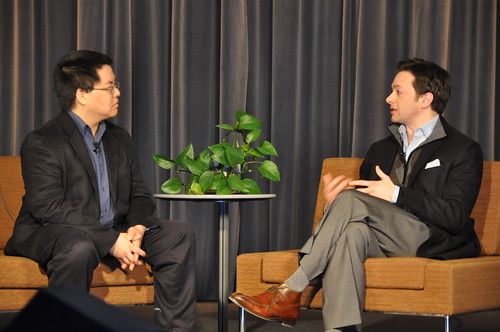
If you're reading this post, then you probably know that I'm a big fan of Patagonia's The Cleanest Line, and often use it as an example of a great company blog in my social media posts and presentations. So when Kasey Kersnowski, Patagonia.com and The Cleanest Line's managing editor emailed me to thank me for covering his blog, I had to ask him for an interview (BTW notice Kasey was smart enough to be monitoring for brand mentions, and reached out to me because I was blogging about his company). Kasey graciously accepted, and here he gives us a 'behind the scenes' look at what goes into crafting one of the best company blogs on the internet.
MC - As you know, I'm a big fan of Patagonia's blog The Cleanest Line, and how you position the blog as being focused more on customer-centric themes such as environmental activism and the outdoors. Why did Patagonia take this approach?
KK - Our founder, Yvon Chouinard, laid the foundation that made the choice an easy one for us. We have a heritage of story telling in our catalogs that goes all the way back to the first Chouinard Equipment catalog in 1972, before the company was called Patagonia. To this day we still devote a significant number of pages in our catalogs to environmental essays and sport-themed field reports -- pure editorial content. We know from years of printing these types of stories in our catalogs that they resonate well with our customers.
The Cleanest Line gives us a place to tell the stories we don't have room for in our catalogs. By telling stories we inspire one another to experience new things and new places, or take action on behalf of worthwhile causes. Part of Patagonia's mission statement says "use business to inspire and implement solutions to the environmental crisis." The nature of social media makes it a great way to fulfill that part of our mission.
MC - Does Patagonia actively monitor what customers are saying online about the brand and your blog?
KK - We're very interested in what people are saying about us. We monitor on a daily basis. It's free feedback that helps us improve all aspects of the company. The key is properly interpreting what is being said, both positive and negative, and recognizing what feedback is appropriate to act on. Every company will have to make those decisions on their own.
MC - What impact has social media had for Patagonia as a business? Are you able to apply any lessons learned from The Cleanest Line into other areas of the business as a whole?
KK - It's helped us get to know our customers better and empowered them to play a bigger part in Patagonia's success. One example: We now give our customers the opportunity to review products on Patagonia.com. They tell us what we're doing well and what needs improving. That's always existed to a degree – customer letters and phone calls have been around for a long time – but the fact that the comments are now public has given our customers a more potent voice.
The Cleanest Line also helps us embrace a more transparent business model. The feedback we received when we launched the Footprint Chronicles was filled with negative comments toward China and the fact that we manufacture some of our garments there. Instead of hiding that fact or blowing those people off, we engaged them on our blog. By hosting the conversation in our house, so to speak, we were able to respond to questions more quickly and clarify our reasons for doing what we do.
The result of that interaction was an important shift in policy. Previously, our catalogs and Web site only listed whether a product was "Made in USA" or "Imported." We now tell our customers the specific country where each of our products is made. If a customer doesn't want to support a product that's made in a particular country, they now have the information to make a precise, informed decision.
MC - Finally, everyone is talking ROI and measuring the success of social media efforts. For The Cleanest Line, how does Patagonia track the 'value' that's being created by the blog? For example, if you write a blog post today, what will need to happen for you to determine that it was a successful blog post?
KK - We track basic statistics like page views, comments, clickthroughs, fans and followers. We certainly want to know if our efforts are relevant and attractive to people. But it's very hard to directly attribute a growth or decline in sales to social media efforts. Our metric is simple: Are we having a good conversation with our readers? Is it inspiring? Are both parties benefiting from the interaction? Through conversation you build a relationship, and the bottom-line of any worthwhile relationship isn’t dollars, but trust. If we can establish trust through our social media outlets, then all our efforts have been worthwhile.
Great insights from Kasey, and I love how Patagonia is using its main website, as well as The Cleanest Line as a place to collect feedback from customers, then implement changes based on their feedback, then notify them of those changes! Perfect example of how you use social media to give your customers a greater sense of ownership in your brand! Make sure you read The Cleanest Line and follow Patagonia on Twitter.
If your company would like to be considered for a future interview in the Social Media Mavens series, please email me. Look for the next interview in this series in two weeks!





